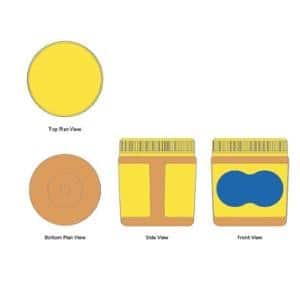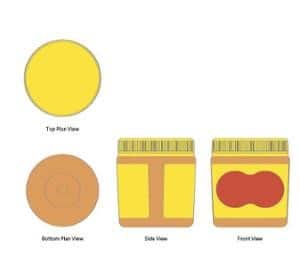Kraft Heinz left holding an empty peanut butter jar with no label (or lid)
The long running legal battle between international food giant Kraft Heinz and Australian company Bega Cheese over packaging for their peanut butters is over with Australia’s highest court throwing out Kraft’s bid to appeal an earlier ruling.
Early this month the High Court of Australia dismissed Kraft’s application for special leave to appeal a Full Federal Court judgement that allowed Bega to continue using its distinctive labels and yellow lid.
It means the Full Court’s decision, which upheld a previous judgement by a single Federal Court judge, and the reasoning around it stands.
Bega Cheese said in a statement after the High Court’s decision: “This decision … confirms Bega Cheese’s right to use the current packaging of its smooth and crunchy peanut butter products.”
The distinctive yellow lid and label is well known to the Australian public and is among Australia’s top-selling brands.
background
Last year, the Federal Court awarded Bega the exclusive rights to use the distinctive yellow, red and blue packaging to market its peanut butter. This came after Bega acquired the peanut butter business and the assets and goodwill of Mondelez Australia (Foods) Ltd (Mondelez) in 2017. The acquisition included the recipes for Vegemite and Kraft’s “never oily, never dry” smooth and crunchy peanut butter.
After the acquisition, Bega started selling Bega branded peanut butter products using the Peanut Butter Trade Dress (PBTD) being “a jar with a yellow lid and a yellow label with a blue or red peanut device, with the jar having a brown appearance when filled”.
That same year, Kraft began selling a similar peanut butter product with the PBTD, under the brand “The Good Nut”.
Bega argued that in addition to purchasing the recipes during the acquisition, it also purchased the right to use the PBTD in conjunction with the peanut butter it manufactured following the acquisition of Mondelez. Kraft alleged that the PBTD was never Mondelez’s to sell and that under the terms of the acquisition, Bega was only entitled to use Kraft’s branding for a limited time under licence.
The Federal Court found at first instance that because the PBTD was inseparable from the goodwill of the peanut butter business, it couldn’t be assigned without the rest of the peanut butter business also being assigned.
Kraft appealed, contending that on the construction of restructure documents dividing the Kraft business before the acquisition, the rights to the PBTD were assigned to a separate entity.
The Full Court rejected Kraft’s grounds for appeal. It did not accept that the restructure document allocated the PBTD to a separate entity. Rather, the PBTD was allocated to the global snacks business, which was later sold during the acquisition.
what next?
This decision will have big ramifications for the below two trade mark applications filed by Kraft Foods Group Brands LLC on 31 January 2017 in both Australia and New Zealand.

Given Bega is the owner at law of the trade dress rights (and associated unregistered trade mark rights), it’s likely both trade mark applications will either be rejected by the Australian Trade Marks Office or successfully opposed by Bega. Either way, Kraft is unlikely to attain registration of these trade mark applications in Australia.
It will be interesting to see how the matter is decided in New Zealand where the Full Federal Court decision isn’t binding, and unlike in Australia an application for registration of a trade mark is personal property.
It’s notable though that the wording of s32 of the Trade Marks Ac t 2002 (NZ) has almost identical wording to that of s27 of the Trade Marks Act 1995 (Cth) in that the applicant must be “a person claiming to be the owner of a trade mark”.
Therefore, it’s anticipated that the same decision will be made in New Zealand, which will result in Bega being successful in its opposition actions.
key takeaways:
- Goodwill doesn’t attach to one particular asset, but to the whole of a business.
- Part of a business may constitute a business in and of itself, provided it is separable from the remaining business.
- Unregistered trade marks can only be assigned through an assignment of the goodwill of the underlying business.
- Corporate restructures are unlikely to effectively transfer unregistered trade mark rights where an aim of the restructure is to separate the IP rights from the trading entity.
WTR Daily, part of World Trademark Review, in December 2020. For further information, please go to www.worldtrademarkreview.com
The information contained in this article is general in nature and cannot be relied on as legal advice nor does it create an engagement. Please contact one of our lawyers listed above for advice about your specific situation.
more
insights
ASIC redacts officeholder data: What your business needs to know
Implied contract terms: Court of Appeal confirms no implied right for hospital to terminate long term emergency services agreement
Bunnings faces off against the Privacy Commissioner over facial recognition technology
stay up to date with our news & insights
Kraft Heinz left holding an empty peanut butter jar with no label (or lid)
The long running legal battle between international food giant Kraft Heinz and Australian company Bega Cheese over packaging for their peanut butters is over with Australia’s highest court throwing out Kraft’s bid to appeal an earlier ruling.
Early this month the High Court of Australia dismissed Kraft’s application for special leave to appeal a Full Federal Court judgement that allowed Bega to continue using its distinctive labels and yellow lid.
It means the Full Court’s decision, which upheld a previous judgement by a single Federal Court judge, and the reasoning around it stands.
Bega Cheese said in a statement after the High Court’s decision: “This decision … confirms Bega Cheese’s right to use the current packaging of its smooth and crunchy peanut butter products.”
The distinctive yellow lid and label is well known to the Australian public and is among Australia’s top-selling brands.
background
Last year, the Federal Court awarded Bega the exclusive rights to use the distinctive yellow, red and blue packaging to market its peanut butter. This came after Bega acquired the peanut butter business and the assets and goodwill of Mondelez Australia (Foods) Ltd (Mondelez) in 2017. The acquisition included the recipes for Vegemite and Kraft’s “never oily, never dry” smooth and crunchy peanut butter.
After the acquisition, Bega started selling Bega branded peanut butter products using the Peanut Butter Trade Dress (PBTD) being “a jar with a yellow lid and a yellow label with a blue or red peanut device, with the jar having a brown appearance when filled”.
That same year, Kraft began selling a similar peanut butter product with the PBTD, under the brand “The Good Nut”.
Bega argued that in addition to purchasing the recipes during the acquisition, it also purchased the right to use the PBTD in conjunction with the peanut butter it manufactured following the acquisition of Mondelez. Kraft alleged that the PBTD was never Mondelez’s to sell and that under the terms of the acquisition, Bega was only entitled to use Kraft’s branding for a limited time under licence.
The Federal Court found at first instance that because the PBTD was inseparable from the goodwill of the peanut butter business, it couldn’t be assigned without the rest of the peanut butter business also being assigned.
Kraft appealed, contending that on the construction of restructure documents dividing the Kraft business before the acquisition, the rights to the PBTD were assigned to a separate entity.
The Full Court rejected Kraft’s grounds for appeal. It did not accept that the restructure document allocated the PBTD to a separate entity. Rather, the PBTD was allocated to the global snacks business, which was later sold during the acquisition.
what next?
This decision will have big ramifications for the below two trade mark applications filed by Kraft Foods Group Brands LLC on 31 January 2017 in both Australia and New Zealand.

Given Bega is the owner at law of the trade dress rights (and associated unregistered trade mark rights), it’s likely both trade mark applications will either be rejected by the Australian Trade Marks Office or successfully opposed by Bega. Either way, Kraft is unlikely to attain registration of these trade mark applications in Australia.
It will be interesting to see how the matter is decided in New Zealand where the Full Federal Court decision isn’t binding, and unlike in Australia an application for registration of a trade mark is personal property.
It’s notable though that the wording of s32 of the Trade Marks Ac t 2002 (NZ) has almost identical wording to that of s27 of the Trade Marks Act 1995 (Cth) in that the applicant must be “a person claiming to be the owner of a trade mark”.
Therefore, it’s anticipated that the same decision will be made in New Zealand, which will result in Bega being successful in its opposition actions.
key takeaways:
- Goodwill doesn’t attach to one particular asset, but to the whole of a business.
- Part of a business may constitute a business in and of itself, provided it is separable from the remaining business.
- Unregistered trade marks can only be assigned through an assignment of the goodwill of the underlying business.
- Corporate restructures are unlikely to effectively transfer unregistered trade mark rights where an aim of the restructure is to separate the IP rights from the trading entity.
WTR Daily, part of World Trademark Review, in December 2020. For further information, please go to www.worldtrademarkreview.com








